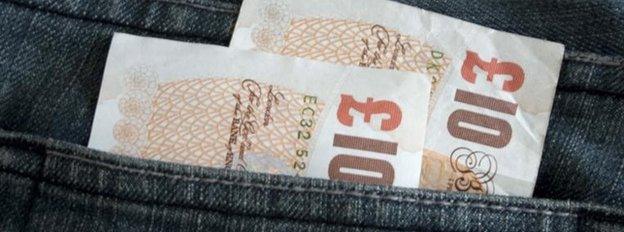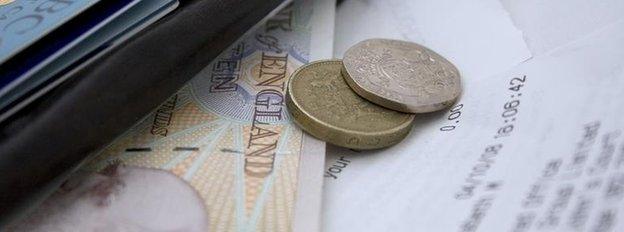The bank switching plan explained
- Published

The UK's competition watchdog says bank customers can save £70 a year by switching their current account provider.
Those who go into an overdraft on a regular basis could save as much as £260 a year by switching accounts.
There are 68 million active personal current accounts in the UK, but only 3% of customers switched last year.
So, what does the Competition and Markets Authority (CMA), external suggest to get those customers moving and, perhaps more importantly, what proposals does it rule out?

How do I switch bank account?
Boring, yes. A bit of a hassle, yes. But actually the process is a lot less painful than it used to be.
Customers need to choose a new bank and account. If the bank or building society is part of the current account switch guarantee, external (and most of them are) you choose a date for the switch to start.
How to leave your bank... in 60 secs
The new bank will switch over the customer's balance and all direct debits and standing orders. The process should be complete within seven working days and, for the next 36 months, any payments made accidentally to the old account will be redirected automatically.

How do I know whether I have a good deal?
That is more difficult, almost impossible in fact, owing to the design of most current accounts in the UK retail banking sector. Customers generally do not pay an upfront charge or a subscription to have a bank account, unless it is a specific packaged account.
The idea that the account is free is actually a myth. Some interest that could be paid is foregone in order for the banks to make money from the account. There are also charges when a customer goes into the red with an overdraft.
So, whether customers are getting a good deal depends on their circumstances. Do they use the overdraft? Do they benefit from other services that come with the account? Is the interest rate any good?
All of that requires a bit of homework.
As for the banks, they love current accounts because all the data they offer about spending patterns is extremely valuable.

What incentives to switch are suggested?

Small businesses, which are even more loyal to a bank that regular consumers, should have access to a price comparison website to allow them to shop around, the CMA says.
It adds that customers should be able to use personal data to get a decent deal on a bank account. The idea of the government-backed "Midata" project is that customers download data of previous transactions into a price comparison website and it crunches the numbers to suggest where they might get a better deal.
But the CMA says the scheme still has lots of shortcomings, not least that it does not work if customers are using one of the most popular smartphones in the UK - the iPhone.
Another suggestion is increased advertising of the switching guarantee.
Banks should also prompt customers to switch when customer service has deteriorated, if a bank branch closes, or overdraft charges change.

Surely the banks should just treat us better?
That is the view of the StepChange debt charity. It says those in financial difficulty just do not want to face "unreasonable" charges or the hassle of switching.
"Clients tell us that when they get into difficulty they do not want to switch, but to be treated better by their existing bank," says the charity's chief executive Mike O'Connor.
Meanwhile, Hannah Maundrell, of Money.co.uk, says the CMA missed a trick by not considering whether bank accounts could be switched instantly rather than a wait of seven working days.

What else did the CMA not bother with?

It ruled out the nuclear decision of proposing a break-up of the big banks. It also ruled out remodelling the free banking system.
Some smaller banks have argued that statements should show how much the account costs, by showing interest foregone. Tesco Bank suggested a traffic light system marking the expense of accounts.
Following a review of nearly two years, the CMA has not suggested any major changes to statements.
Organisations such as the consumer group Which? says the CMA does not go far enough in its report.
Significantly, the CMA has not looked at the mis-selling of interest-rate hedging products which prevented many small businesses from switching banks.

How have the banks reacted to all this?
The inquiry was not universally welcomed at launch by the big banks. Barclays and Lloyds Banking Group said that the review was "not appropriate" and "unnecessary". HSBC said the CMA had taken a "backward looking view" of current accounts.
The BBA, which represents the major banks, says the inquiry's recommendations built on work already being done, but called for a level playing field for established banks and newcomers.
Some of the smaller players are still very keen to highlight the dominance of the big four banking groups - Lloyds, RBS, Barclays and HSBC.

Haven't we heard this argument before?
The retail banking industry is no stranger to competition reviews, such as:
In 2002 there was a Competition Commission inquiry, external into the supply of banking services to small businesses by clearing banks
In 2008 the Office of Fair Trading investigated the provision of personal current accounts
In 2011 the Independent Commission on Banking also made recommendations aimed at promoting financial stability and competition.
All of them, in one way or another, have called for an encouragement for customers to switch.